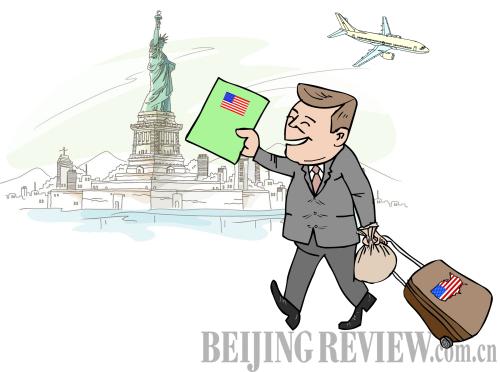|
 |
|
(LI SHIGONG) |
The emigration of rich Chinese is nowadays developing into a big trend. Recently, after it was revealed that Zhang Lan, chief of local restaurant chain South Beauty, gave up her Chinese nationality and membership in the Chinese People's Political Consultative Conference, the country's top political advisory body, the topic of emigration among the wealthy again sparked public shock and debate. Among the 20,000 Chinese with at least 100 million yuan ($15 million) in individual investment assets, 27 percent have already emigrated while 47 percent are considering doing so, according to a report by China Merchants Bank and U.S. consultants Bain & Co. published in April. Nearly 60 percent of people surveyed said they wanted to seek better education for their children. In addition, 14 percent of China's millionaires are on the way to other countries or are planning to leave, the average wealth among these valued at more than 60 million yuan ($ 9.5 million) and age at 42. These are bothersome statistics. The emigration of rich people has not only led to a massive outflow of private money, but has also dealt a heavy blow to the country's tax revenues, market consumption and even the gloomy employment market. According to the Annual Report on International Politics and Security issued by the Chinese Academy of Social Sciences, the country is becoming the biggest exporter of migrants with around 45 million Chinese currently scattered across the globe.
Qing Chuan (www.rednet.cn): The emigration of the rich is obviously a loss to the country. They have not only swept away a large amount of wealth, but have also taken with them expertise and wisdom, deepening social crises. Therefore, some people hope that there will be certain restrictions set on such emigration. However, this seems unlikely. If people are kept from emigrating overseas, it not only goes against China's major policy of opening up to the outside world, but also tramples on citizens' legitimate rights of free movement.
Reasons behind the emigration of the rich often come down to children's education, food safety, environmental quality, the freedom of going abroad and also asset safety.
In most cases, emigration has nothing to do with a lack of patriotism. In fact, once emigrated, many millionaires continue doing business in China in efforts to share in its success. To some extent, emigration comes down to a form of family insurance, reflecting a lack of confidence in the country's future. This is indeed depressing news in light of China's impressive progress.
However, it might not be such a bad thing since the motivation behind emigration lies not in mere money making, but in the pursuit of improved living conditions and increased social stability.
Either way, China is actively involved in convincing its wealthy classes to remain by further deepening economic and social reforms, improving the education system so children can enjoy high-quality resources, improving relevant laws to better protect private assets, setting up a healthcare and pension system to ease social disparity and promoting social justice.
Han Shinan (Qilu Evening News): The rich are in control of huge assets and mostly in the prime of life. Although they have the right to choose to stay or go, this kind of massive emigration is a loss of both wisdom and wealth to China. The question is, while the country's economy is booming, how come so many rich people are rushing to other countries?
While there are many reasons for the rich to emigrate, the main factors revolve around the search for a better life, better education and better protection of private assets. It is a personal choice and a country should have the confidence and open-mindedness to allow this to happen. However, when emigration becomes a trend and fashion, it could damage the overall strength of a country and also its international competitiveness.
Emigration is not a fresh topic in China, which experienced various waves during the late 1970s, early 1980s and 1990s. However, recent emigration among the rich often accompanies overseas investments based on the accumulation of wealth during 30 years of reform and opening up. To some extent, this results in the transfer of China's development fruits. The departure of those with professional knowledge and the dream of starting big businesses is an immeasurable loss to the country, which is still a developing economy.
Emigration itself is not terrible. Looking at global trends, China is not the only country losing its citizens. India, South Korea and many others are facing similar problems. Thus, emigration needs a rational approach, especially if the goal involves countermeasures such as improving the environment, educational reform and advancing asset safety, etc.
The outflow of wealth and talent reveals a China is experiencing many problems in the process of rapid development. Nevertheless, as long as we work hard at building a rich, healthy and harmonious society, our country might just become an ideal emigration destination for citizens from other parts of the world. Some Chinese emigrants might even decide to return.
|
